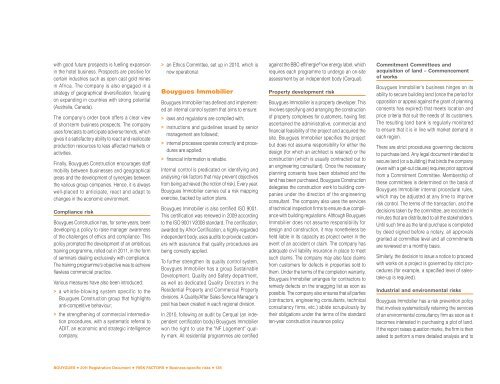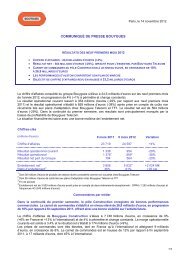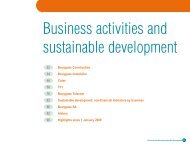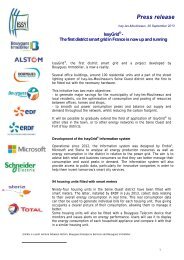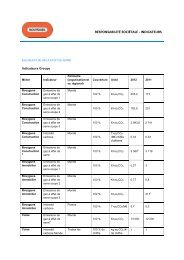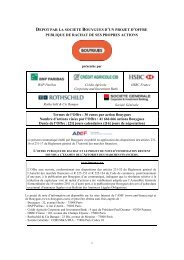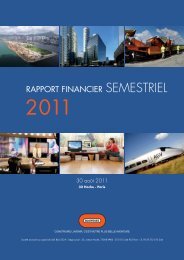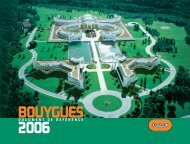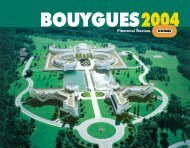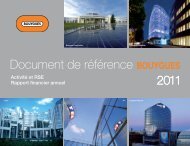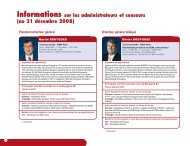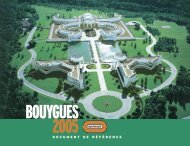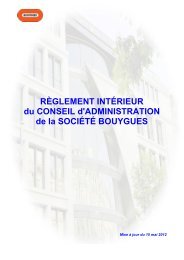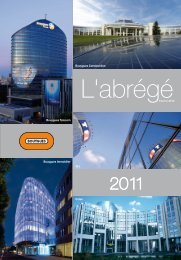Registration Document BOUYGUES
Registration Document BOUYGUES
Registration Document BOUYGUES
Create successful ePaper yourself
Turn your PDF publications into a flip-book with our unique Google optimized e-Paper software.
with good future prospects is fuelling expansion<br />
in the hotel business. Prospects are positive for<br />
certain industries such as open cast gold mines<br />
in Africa. The company is also engaged in a<br />
strategy of geographical diversification, focusing<br />
on expanding in countries with strong potential<br />
(Australia, Canada).<br />
The company's order book offers a clear view<br />
of short-term business prospects. The company<br />
uses forecasts to anticipate adverse trends, which<br />
gives it a satisfactory ability to react and reallocate<br />
production resources to less affected markets or<br />
activities.<br />
Finally, Bouygues Construction encourages staff<br />
mobility between businesses and geographical<br />
areas and the development of synergies between<br />
the various group companies. Hence, it is always<br />
well-placed to anticipate, react and adapt to<br />
changes in the economic environment.<br />
Compliance risk<br />
Bouygues Construction has, for some years, been<br />
developing a policy to raise manager awareness<br />
of the challenges of ethics and compliance. This<br />
policy prompted the development of an ambitious<br />
training programme, rolled out in 2011, in the form<br />
of seminars dealing exclusively with compliance.<br />
The training programme's objective was to achieve<br />
flawless commercial practice.<br />
Various measures have also been introduced:<br />
> a whistle-blowing system specific to the<br />
Bouygues Construction group that highlights<br />
anti-competitive behaviour;<br />
> the strengthening of commercial intermediation<br />
procedures, with a systematic referral to<br />
ADIT, an economic and strategic intelligence<br />
company;<br />
> an Ethics Committee, set up in 2010, which is<br />
now operational.<br />
Bouygues Immobilier<br />
Bouygues Immobilier has defined and implemented<br />
an internal control system that aims to ensure:<br />
> laws and regulations are complied with;<br />
> instructions and guidelines issued by senior<br />
management are followed;<br />
> internal processes operate correctly and procedures<br />
are applied;<br />
> financial information is reliable.<br />
Internal control is predicated on identifying and<br />
analysing risk factors that may prevent objectives<br />
from being achieved (the notion of risk). Every year,<br />
Bouygues Immobilier carries out a risk mapping<br />
exercise, backed by action plans.<br />
Bouygues Immobilier is also certified ISO 9001.<br />
This certification was renewed in 2009 according<br />
to the ISO 9001 V2008 standard. The certification,<br />
awarded by Afnor Certification, a highly-regarded<br />
independent body, uses audits to provide customers<br />
with assurance that quality procedures are<br />
being correctly applied.<br />
To further strengthen its quality control system,<br />
Bouygues Immobilier has a group Sustainable<br />
Development, Quality and Safety department,<br />
as well as dedicated Quality Directors in the<br />
Residential Property and Commercial Property<br />
divisions. A Quality/After Sales Service Manager's<br />
post has been created in each regional division.<br />
In 2010, following an audit by Cerqual (an independent<br />
certification body) Bouygues Immobilier<br />
won the right to use the "NF Logement" quality<br />
mark. All residential programmes are certified<br />
against the BBC-effinergie ® low energy label, which<br />
requires each programme to undergo an on-site<br />
assessment by an independent body (Cerqual).<br />
Property development risk<br />
Bouygues Immobilier is a property developer. This<br />
involves specifying and arranging the construction<br />
of property complexes for customers, having first<br />
ascertained the administrative, commercial and<br />
financial feasibility of the project and acquired the<br />
site. Bouygues Immobilier specifies the project<br />
but does not assume responsibility for either the<br />
design (for which an architect is retained) or the<br />
construction (which is usually contracted out to<br />
an engineering consultant). Once the necessary<br />
planning consents have been obtained and the<br />
land has been purchased, Bouygues Construction<br />
delegates the construction work to building companies<br />
under the direction of the engineering<br />
consultant. The company also uses the services<br />
of technical inspection firms to ensure due compliance<br />
with building regulations. Although Bouygues<br />
Immobilier does not assume responsibility for<br />
design and construction, it may nonetheless be<br />
held liable in its capacity as project owner in the<br />
event of an accident or claim. The company has<br />
adequate civil liability insurance in place to meet<br />
such claims. The company may also face claims<br />
from customers for defects in properties sold to<br />
them. Under the terms of the completion warranty,<br />
Bouygues Immobilier arranges for contractors to<br />
remedy defects on the snagging list as soon as<br />
possible. The company also ensures that all parties<br />
(contractors, engineering consultants, technical<br />
consultancy firms, etc.) abide scrupulously by<br />
their obligations under the terms of the standard<br />
ten-year construction insurance policy.<br />
Commitment Committees and<br />
acquisition of land – Commencement<br />
of works<br />
Bouygues Immobilier's business hinges on its<br />
ability to secure building land (once the period for<br />
opposition or appeal against the grant of planning<br />
consents has expired) that meets location and<br />
price criteria that suit the needs of its customers.<br />
The resulting land bank is regularly monitored<br />
to ensure that it is in line with market demand in<br />
each region.<br />
There are strict procedures governing decisions<br />
to purchase land. Any legal document intended to<br />
secure land (or a building) that binds the company<br />
(even with a get-out clause) requires prior approval<br />
from a Commitment Committee. Membership of<br />
these committees is determined on the basis of<br />
Bouygues Immobilier internal procedural rules,<br />
which may be adjusted at any time to improve<br />
risk control. The terms of the transaction, and the<br />
decisions taken by the committee, are recorded in<br />
minutes that are distributed to all the stakeholders.<br />
Until such time as the land purchase is completed<br />
by deed signed before a notary, all approvals<br />
granted at committee level and all commitments<br />
are reviewed on a monthly basis.<br />
Similarly, the decision to issue a notice to proceed<br />
with works on a project is governed by strict procedures<br />
(for example, a specified level of salestake-up<br />
is required).<br />
Industrial and environmental risks<br />
Bouygues Immobilier has a risk prevention policy<br />
that involves systematically retaining the services<br />
of an environmental consultancy firm as soon as it<br />
becomes interested in purchasing a plot of land.<br />
If the report raises question marks, the firm is then<br />
asked to perform a more detailed analysis and to<br />
<strong>BOUYGUES</strong> • 2011 <strong>Registration</strong> <strong>Document</strong> • RISK FACTORS • Business-specific risks • 138


